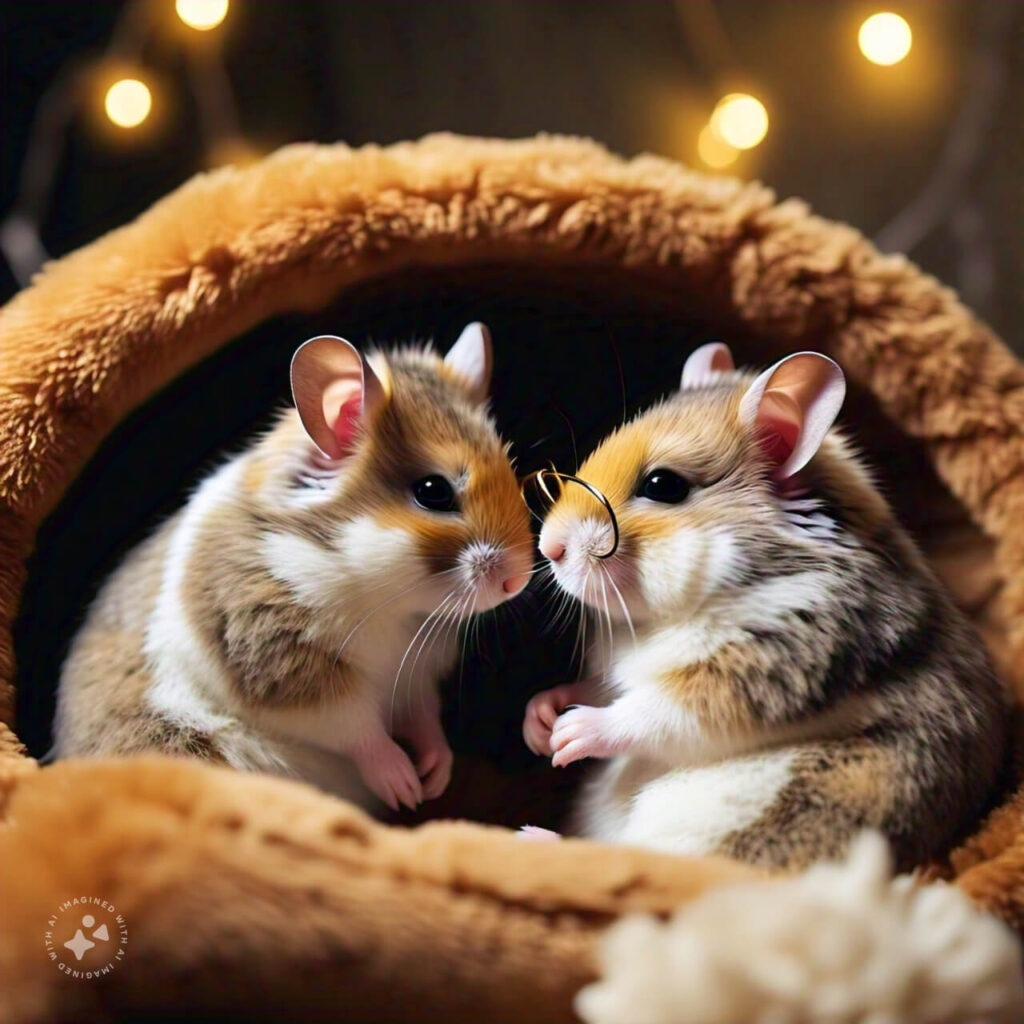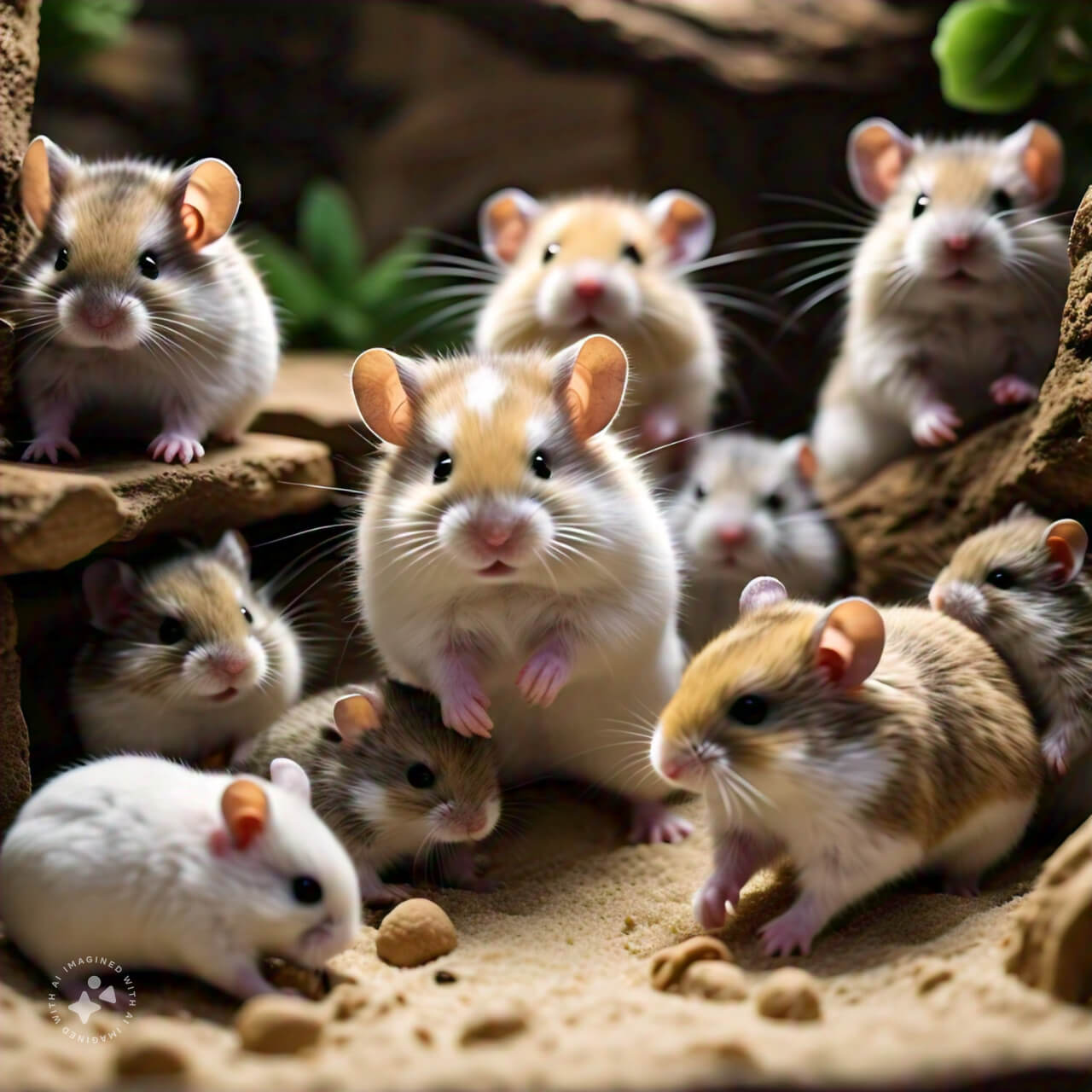Why Are Hamsters Nocturnal – hamsters.pk
Unveiling the Nightlife: Understanding Why Hamsters Prefer the Dark
Hamsters are fascinating creatures, especially when it comes to their preference for the dark. Often found bustling around during the night, these small rodents have evolved to become nocturnal. But why exactly do they prefer the nightlife? Let’s dive into the reasons behind their nocturnal nature and how it benefits them.
Why Hamsters Are Nocturnal
The primary reason hamsters are nocturnal lies in their survival instincts. In the wild, these creatures are vulnerable to various predators. Operating under the cover of darkness reduces the chances of being spotted by predators such as birds of prey and other larger mammals. The dark offers them a protective veil, allowing them to search for food, mate, and explore their territory with reduced risk.
Adaptations to Nocturnal Life
Hamsters have developed several adaptations that make them well-suited for a nocturnal lifestyle. Their eyes, for instance, are particularly adapted to low-light conditions, allowing them to see even in the dim light of night. Moreover, their hearing and sense of smell are highly developed, enabling them to navigate and communicate effectively in the dark.
Behavioral Patterns of Nocturnal Hamsters
During the day, hamsters typically retreat to their burrows to avoid the dangers that daylight might bring. This behavior also helps them conserve energy for their night-time activities. Once the sun sets, they become highly active, engaging in various activities such as foraging for food and building nests. This period of activity is crucial for their physical health and overall well-being.
Benefits of Understanding Hamster Nocturnality
For pet owners, understanding the nocturnal nature of hamsters can significantly enhance the care they provide. Recognizing that hamsters are active at night and sleep most of the day can help owners avoid disturbing them during their rest periods. It also explains why hamsters might be more interactive and playful during late hours, which can be a delightful experience for nocturnal pet owners themselves.
In conclusion, the nocturnal habits of hamsters are not just a trivial trait but a fundamental aspect of their survival and behavior. By understanding why hamsters prefer the dark, owners can create a more accommodating and nurturing environment for their furry friends. Whether they’re safely exploring their cage at night or snuggled up in their burrows, hamsters are perfectly adapted to thrive in the nightlife, just as nature intended.
From Dusk Till Dawn: The Evolutionary Benefits of Hamsters Being Nocturnal

Hamsters, those adorable little creatures often seen scurrying around in their cages during the late hours, are predominantly nocturnal. This behavioral trait is not just a mere preference but a deep-rooted evolutionary adaptation that offers numerous benefits to these small rodents. Let’s delve into why hamsters have evolved to embrace the night and how this impacts their survival and way of life.
Understanding Nocturnal Behavior in Hamsters
Nocturnality in hamsters is primarily driven by their need for protection against predators. In the wild, hamsters are vulnerable to various predators, including birds of prey, snakes, and larger mammals. The cover of darkness provides these tiny creatures with the camouflage they need to carry out their activities with a lower risk of being spotted and preyed upon.
Enhanced Sensory Capabilities
One significant evolutionary benefit for nocturnal hamsters is their enhanced sensory capabilities. Hamsters have highly developed senses of hearing and smell, which are crucial during the night. These senses allow them to navigate their environment, locate food, and sense predators or other dangers in almost complete darkness. The development of such acute sensory organs is a direct result of their nocturnal lifestyle.
Optimal Foraging Strategies
Being active at night also allows hamsters to take advantage of cooler temperatures, especially in arid and semi-arid environments where they often live. Foraging for food in the cool of the night is much more energy-efficient, as it reduces the need for water and lowers the risk of overheating. This behavior also aligns with the availability of certain plants and insects that may be more accessible or abundant at night.
Social and Reproductive Advantages
Nocturnality also plays a crucial role in the social and reproductive behaviors of hamsters. Activities such as mating and searching for a mate are often safer at night, when fewer predators are active. Furthermore, the solitude of night allows for less competition over resources with other diurnal species, giving hamsters a better chance at finding food and nesting sites without interference.
In conclusion, the nocturnal habits of hamsters are not just a peculiar trait but a complex adaptation that has evolved over millennia. From providing safety from predators to enhancing their ability to find food and mate, being active from dusk till dawn offers significant evolutionary benefits to these small yet fascinating creatures. As pet owners or animal enthusiasts, understanding these aspects of hamster behavior can help us appreciate these animals in new and insightful ways.
Night Owls of the Rodent World: What Drives Hamsters to Be Active at Night?
Hamsters, those adorable little furballs that captivate the hearts of pet owners worldwide, have a fascinating trait that often puzzles their human companions: they are predominantly nocturnal. This article explores the reasons behind this behavior, shedding light on the evolutionary, physiological, and environmental factors that influence these tiny creatures to be active during the night.
The Evolutionary Advantage
Hamsters originate from arid environments like Syria’s deserts, where daytime temperatures can be extremely harsh. Their nocturnal nature is primarily an evolutionary adaptation that allows them to avoid the scorching daytime heat and the predation risks presented by diurnal predators. By limiting their activity to cooler, darker hours, hamsters conserve water and maintain a lower metabolic rate, which is crucial for survival in their natural habitat.
Physiological Factors Driving Nocturnal Behavior
At the core of their nocturnal behavior are the hamster’s biological rhythms. These creatures are governed by what’s known as the circadian rhythm, an internal clock that dictates their sleep-wake cycles. This rhythm is influenced by environmental cues such as light and temperature, aligning the hamsters’ active periods with the nighttime. Moreover, their eyes are particularly suited to low-light conditions, allowing them to see and forage effectively in the dark.
Survival Strategies in the Wild
In the wild, the cover of night provides hamsters with the safety they need to carry out essential activities like foraging and seeking water. Nighttime activity reduces the risk of being spotted by predators, which include birds of prey, snakes, and carnivorous mammals. This nocturnal lifestyle also aids in their communication and social interactions, as the darkness helps mask their movements from potential threats while they search for food and mates.
Adaptations to Captive Life
In captivity, hamsters maintain their nocturnal routine, although it might seem less relevant without the presence of natural predators or the need to forage for food. This can sometimes lead to frustration for pet owners who are active during the day and expect interaction with their pets. Understanding that this behavior is deeply ingrained can help owners create a more accommodating environment. For example, providing enrichment activities during the evening can align with their natural active period, making pet hamsters more lively and interactive when their owners are available.
In conclusion, the nocturnal nature of hamsters is a multifaceted behavior that enhances their survival and aligns with their physiological needs. Whether in the wild or in a cozy home setting, these night owls of the rodent world are perfectly adapted to thrive under the cover of darkness. Understanding and respecting their natural patterns can help ensure that these charming creatures lead happy and healthy lives.
Exploring the Shadows: How Nocturnality Supports Hamster Survival and Behavior
Hamsters, those adorable, furry creatures that have captivated the hearts of pet owners around the world, are often observed bustling around their cages during the late hours. This nocturnal nature is not just a quirky trait but a fundamental aspect of their survival and behavioral patterns. In this article, we delve into the reasons behind their nocturnality and how it enhances their ability to thrive in both wild and domestic environments.
Why Are Hamsters Nocturnal?
Hamsters originate from desert regions where daytime temperatures can be extremely high. To avoid the harsh sunlight and intense heat, hamsters have evolved to be active during the cooler, nighttime hours. This behavior helps them conserve energy and maintain a comfortable body temperature while performing all necessary activities like foraging for food and seeking mates.
Adaptations to Nocturnal Life
The physical and behavioral adaptations of hamsters are specifically tuned to their nocturnal lifestyle. Their large, sensitive eyes are well adapted to low-light conditions, allowing them to navigate and forage effectively at night. Additionally, hamsters have an acute sense of hearing and smell, which helps them detect predators and other dangers in the darkness, ensuring their survival in the wild.
Impact on Domestic Hamsters
Even in captivity, hamsters exhibit these nocturnal traits. Pet owners might notice that their hamster becomes more active and lively during the evening and night. Understanding this pattern is crucial for creating a comfortable environment for pet hamsters, as it influences their feeding schedule, interaction times, and the design of their living space.
Behavioral Benefits of Being Nocturnal
Nocturnality also plays a significant role in the social and psychological health of hamsters. By being active at night, they can engage in natural behaviors such as burrowing and exploring without the stress of daylight exposure. This can lead to a more relaxed and healthier hamster, exhibiting fewer signs of anxiety and stress.
In conclusion, the nocturnal nature of hamsters is a defining trait that influences their behavior, physiology, and overall well-being. Whether in the wild or in our homes, these night-time activities are crucial for their survival and happiness. By embracing and accommodating their natural patterns, pet owners can ensure their hamsters lead fulfilling and joyful lives.








